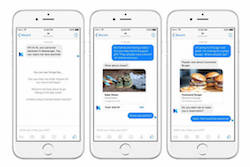 Facebook has soft-launched an intelligent virtual assistant that is embedded within the company’s Messenger iOS and Android apps.
Facebook has soft-launched an intelligent virtual assistant that is embedded within the company’s Messenger iOS and Android apps.
In an online post, David Marcus, head of Facebook’s messaging apps and former CEO of PayPal, explained the capabilities of the service, dubbed M, which was rolled out to a few hundred people in the San Francisco Bay Area:
Today we’re beginning to test a new service called M. M is a personal digital assistant inside of Messenger that completes tasks and finds information on your behalf. It’s powered by artificial intelligence that’s trained and supervised by people.
Unlike other AI-based services in the market, M can actually complete tasks on your behalf. It can purchase items, get gifts delivered to your loved ones, book restaurants, travel arrangements, appointments and way more.
This is early in the journey to build M into an at-scale service. But it’s an exciting step towards enabling people on Messenger to get things done across a variety of things, so they can get more time to focus on what’s important in their lives.
The news was picked up quickly by all major tech media outlets, including Wired, TechCrunch, Wall Street Journal, re/code, and others.
While most of the media coverage focused on the direct competition with more well-known, consumer-based intelligent assistants, including Apple’s Siri, Google Now, Microsoft’s Cortana and Amazon’s Alexa, BBC’s David Lee points out the potential of Facebook’s M as the future of call centers.
The inclusion of M as part of Facebook’s Messenger app does underscore a growing trend of messaging platforms that are being used for marketing and customer care, as noted in a recent Opus Research webcast.
In the webcast, Tobias Goebel, director of emerging technologies with Aspect Software, talks about how WhatsApp (Facebook), WeChat and others have caught on as vehicles for comparison shopping, product selection and social networking to support all manner of digital commerce.
Messaging apps have certainly caught on as the preferred channels for customers in China and elsewhere. But it remains to be seen how a personal digital assistant might encourage more adoption of Messenger and similar apps here in the U.S.
Also noted with the M announcement was the inclusion of human assistance, or so-called “M Trainers,” that will serve as additional resources for requests made through the Messenger app. Indeed, human-aided assistance is not uncommon with intelligent assistants, including Interactions’ Virtual Assistant (IVA) application which transitions automated responses with human assistance to efficiently allow associates to solve issues.
Facebook’s M is built upon wit.ai, an open platform for natural language processing, artificial intelligence (AI) and machine learning, that was acquired earlier this year. In the article from Wired, Alex Lebrun, founder of wit.ai, said “The AI tries to do everything … but the AI is supervised by the people.”
Clearly it will be fascinating to see how the Facebook service scales and can grow with more input from consumers, upwards to the 700 million current Messenger users.
Perhaps we’ll hear more when Alex Lebrun, and many other industry experts, participate at the Intelligent Assistants Conference, hosted by Opus Research at the W Hotel New York on October 13-14.
Categories: Conversational Intelligence, Intelligent Assistants, Articles

 Getting It Right: What AI Agents Actually Mean for Customer Support (Webinar)
Getting It Right: What AI Agents Actually Mean for Customer Support (Webinar)  Beyond the Basics: How AI Is Transforming B2B Sales at TP
Beyond the Basics: How AI Is Transforming B2B Sales at TP  Five9 Launches Agentic CX: Toward AI Agents That Reason and Act
Five9 Launches Agentic CX: Toward AI Agents That Reason and Act  2025 Conversational AI Intelliview: Decision-Makers Guide to Self-Service & Enterprise Intelligent Assistants
2025 Conversational AI Intelliview: Decision-Makers Guide to Self-Service & Enterprise Intelligent Assistants